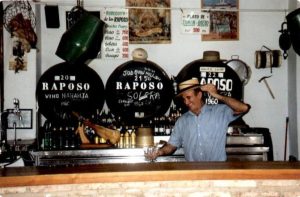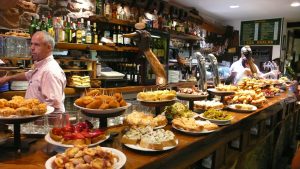
Rocio: The caravan of light
Andalusians generally spend a lot of money on pilgrimages, to make their yearly visits to the Virgin much-talked-about.
The pilgrimage is not just a festive consequence of a Christian eagerness (mostly for the Virgin Mary), but there are many attractions even before the beginning of the pilgrimage. Dressing in the pilgrim (romero/romera) costume is a ritual that is fulfilled in all of its senses, physical, spiritual, folk.
Getting together again with the eternal friends from the fraternity, enjoying the preparations, decorating the Simpecado (standard carried on a wheeled altar), and preparing one’s own wagon and turn it into a singing cloud, leaving the quarters triumphantly, like a troop ready to conquer, on horseback with or without one’s partner, among applause (like the legions of Caesar), with the sound of drums and Sevillana songs…
In the mornings Seville has a special light decorated by the slow transit of wagons drawn by patient oxen that look like creatures from another civilization. And in the place of honor is the Simpecado, which is the center of worship until the brotherhood reaches the village of Almonte along the way with singing and dancing prayers, water and wine celebrating the time that is to come. In the village the queen is the image of the Virgin, found centuries ago by a hunter.
The morning the pilgrims leave they shine more than the sun; the bells pealing with joy encourage the spring adventure, and the rest is an exhibition of a traveling popular art, of invisible loving hands. The way to the village is something else, voices drop when the city is left way behind, the pilgrims’ throats are sore and their feet feel heavy, they have to measure their strength. The third act is the leiv motiv: staying in the crowded village, the sacred place of the Blanca Paloma (White Dove, the popular name of the Virgin in this village).
The return may look like a retiring army full of emotions, but this is not so, they still have strength to sing sadly about the end of the pilgrimage until the following year, so far away.

Rocio: The caravan of light
Andalusians generally spend a lot of money on pilgrimages, to make their yearly visits to the Virgin much-talked-about.
The pilgrimage is not just a festive consequence of a Christian eagerness (mostly for the Virgin Mary), but there are many attractions even before the beginning of the pilgrimage. Dressing in the pilgrim (romero/romera) costume is a ritual that is fulfilled in all of its senses, physical, spiritual, folk.
Getting together again with the eternal friends from the fraternity, enjoying the preparations, decorating the Simpecado (standard carried on a wheeled altar), and preparing one’s own wagon and turn it into a singing cloud, leaving the quarters triumphantly, like a troop ready to conquer, on horseback with or without one’s partner, among applause (like the legions of Caesar), with the sound of drums and Sevillana songs…
In the mornings Seville has a special light decorated by the slow transit of wagons drawn by patient oxen that look like creatures from another civilization. And in the place of honor is the Simpecado, which is the center of worship until the brotherhood reaches the village of Almonte along the way with singing and dancing prayers, water and wine celebrating the time that is to come. In the village the queen is the image of the Virgin, found centuries ago by a hunter.
The morning the pilgrims leave they shine more than the sun; the bells pealing with joy encourage the spring adventure, and the rest is an exhibition of a traveling popular art, of invisible loving hands. The way to the village is something else, voices drop when the city is left way behind, the pilgrims’ throats are sore and their feet feel heavy, they have to measure their strength. The third act is the leiv motiv: staying in the crowded village, the sacred place of the Blanca Paloma (White Dove, the popular name of the Virgin in this village).
The return may look like a retiring army full of emotions, but this is not so, they still have strength to sing sadly about the end of the pilgrimage until the following year, so far away.



